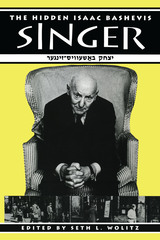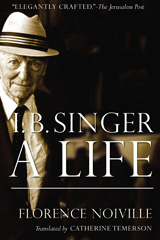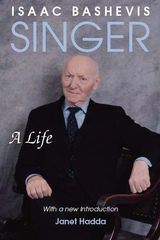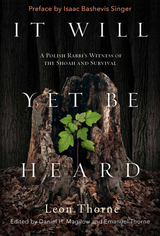
Nobel Prize-winning author Isaac Bashevis Singer stands virtually alone among prominent writers for being more widely known through translations of his work than through the original texts. Yet readers and critics of the Yiddish originals have long pointed out that the English versions are generally shortened, often shorn of much description and religious matter, and their perspectives and denouements are significantly altered. In short, they turn the Yiddish author into a Jewish-American English writer, detached from of his Eastern European Jewish literary and cultural roots.
By contrast, this collection of essays by leading Yiddish scholars seeks to recover the authentic voice and vision of the writer known to his Yiddish readers as Yitskhok Bashevis. The essays are grouped around four themes:
- The Yiddish language and the Yiddish cultural experience in Bashevis's writings
- Thematic approaches to the study of Bashevis's literature
- Bashevis's interface with other times and cultures
- Interpretations of Bashevis's autobiographical writings
A special feature of this volume is the inclusion of Joseph Sherman's new, faithful translation of a chapter from Bashevis's Yiddish "underworld" novel Yarme and Keyle.

In this vivid biography, Florence Noiville offers a glimpse into the world of this much-loved but persistently elusive writer: Isaac Bashevis Singer. Singer (1904–91) is generally recognized as the most popular Yiddish writer of the twentieth century. His widely translated body of work, for which he received the Nobel Prize in Literature in 1978, is beloved around the world. But although Singer was a very public and outgoing figure, much about his personal life remains unknown.
Singer was greatly influenced by his early years in Poland, with his rabbi father and rationalist, secular mother. His interest in themes of faith and dilemma stem directly from this set of conflicts; he bounced back and forth between revering and fighting orthodoxy. This was not the only paradox in his life, however: this man, who wrote many successful children’s books, had abandoned his first wife and only son in Poland as the Nazis began to sweep across Europe. His novels and stories are recognized for their mystical, folkloric tone and his public image was that of a grandfather or uncle; but he was wracked with self-doubt, a womanizer, and, as Noiville writes, a “modern virtuoso of anguish, inhibition, and fiasco.”
Noiville speaks to these and other paradoxes surrounding her subject, drawing on letters, personal stories, Singer’s own autobiographies, and interviews with friends, family, and publishing contemporaries. She travels as he did, from Poland to New York to Florida, tracing his journey from penniless immigrant to Nobel laureate. By pursuing Singer’s public and private past, she rebuilds his story and the story of the world he wrote from: a Yiddish world, a Poland removed from history by Nazi Germany.

Isaac Bashevis Singer brought the vibrant milieu of pre-Holocaust Polish Jewry to the English-speaking world through his subtle psychological insight, deep sympathy for the eccentricities of Jewish folk custom, and unerring feel for the heroism of everyday life. His novels, including The Family Moskat and Enemies: A Love Story, and his short stories, such as "Yentl" and "Gimpel the Fool," prove him a consummate storyteller and probably the greatest Yiddish writer of the twentieth century.

Rabbi Thorne composed his memoir under extraordinary conditions, confined to a small underground bunker below a Polish peasant’s pigsty. But, It Will Yet Be Heard is remarkable not only for the story of its composition, but also for its moral clarity and complexity. A deeply religious man, Rabbi Thorne bore witness to forced labor camps, human degradation, and the murders of entire communities. And once he emerged from hiding, he grappled not only with survivor’s guilt, but also with the lingering antisemitism and anti-Jewish violence in Poland even after the war ended. Harrowing, moving, and deeply insightful, Rabbi Thorne’s firsthand account offers a rediscovered perspective on the twentieth century’s greatest tragedy.

The Manor and The Estate—combined in this one-volume edition—bold tales of Polish Jews in the latter half of the nineteenth century, a time of rapid industrial growth and radical social change that enabled the Jewish community to move from the ghetto to prominent positions within Polish society.
READERS
Browse our collection.
PUBLISHERS
See BiblioVault's publisher services.
STUDENT SERVICES
Files for college accessibility offices.
UChicago Accessibility Resources
home | accessibility | search | about | contact us
BiblioVault ® 2001 - 2024
The University of Chicago Press









